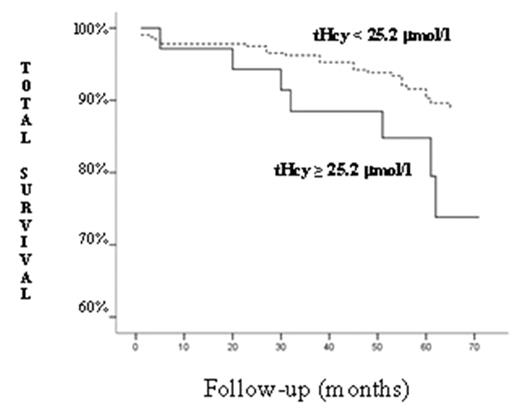Abstract
Background: Hyperhomocysteinemia (HHCY), a known risk factor for thrombosis, is frequently found in patients with chronic ischemic heart disease, but its independent prognostic impact is still controversial.
Aim: To evaluate the relationship between HHCY and mortality in patients after coronary artery bypass grafting (CABG) surgery.
Methods: We prospectively followed 353 patients (mean age 60.1 ± 9.0; 83.3% males) who underwent elective CABG between May 1996 and May 1999.
Results: after a median follow-up of 58 months, 36 patients (10.1%) had died, 28 because of cardiovascular events (Figure 1). Baseline homocysteine levels >90th of distribution (i.e. >25.2 μmol/L) were independently associated to total mortality: OR = 2.39, 95% CIs 1.02–5.59, P=0.035, after adjustment for age, sex, baseline renal function (glomerular filtration rate estimated by MDRD equation), and high-sensitivity C Reactive Protein, by logistic regression. HHCY was also independently associated with mortality due to cardiovascular events, adjusted as above including the presence or absence of myocardial infarction prior to CABG (OR = 2.66, 95% CIs 1.02–6.96, P=0.045).
Conclusions: Moderate (>25.2 μmol/L) HHCY is an independent predictor of total and cardiovascular mortality after CABG. At least in this specific subgroup of cardiovascular patients, low-cost strategies to lower homocysteine (i.e. supplementation with folate and B vitamins) should be implemented.
Author notes
Corresponding author


This feature is available to Subscribers Only
Sign In or Create an Account Close Modal